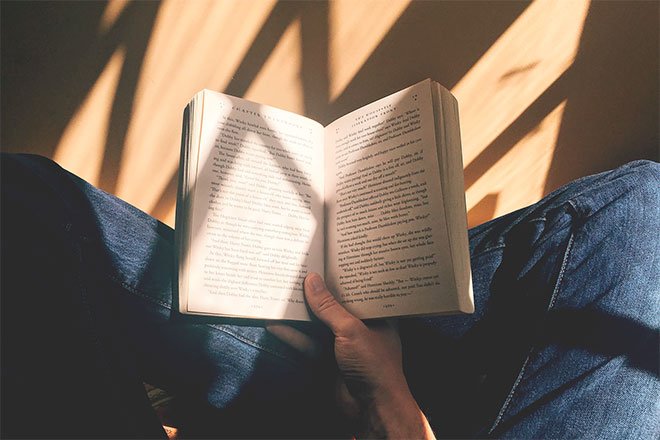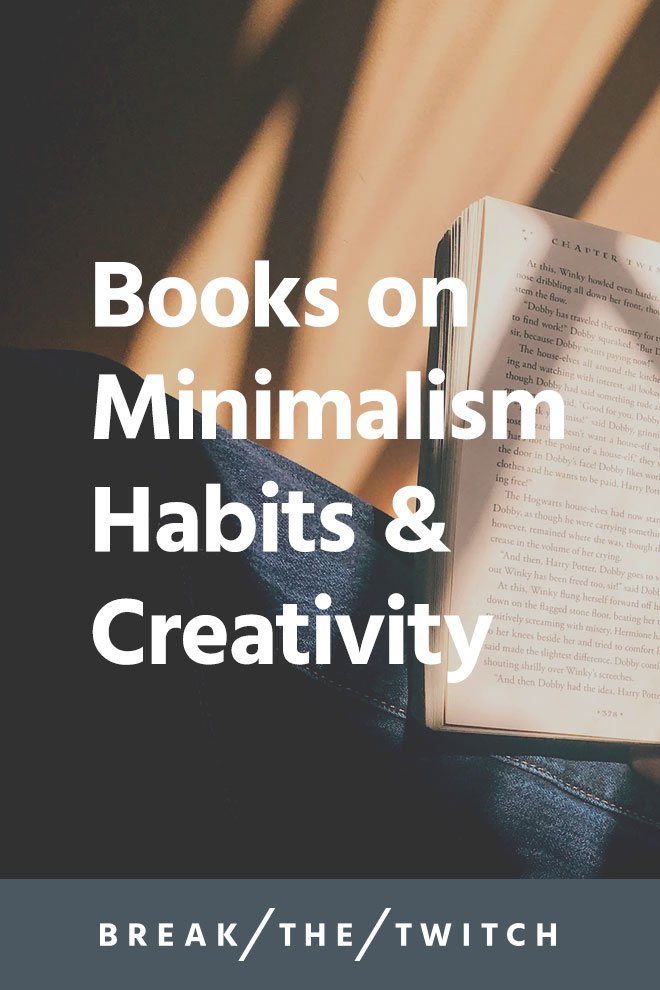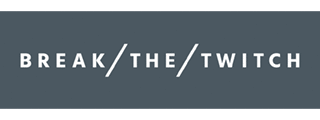
It’s hard to overstate the importance that reading has had in my life.
I remember focusing my attention on the nonfiction/personal development section of my favorite book stores back in high school, and that attraction still hasn’t left me. Some of the best things I’ve read were book recommendations from close friends who enjoyed reading them as well.
Many books have influenced my own perspective over the years and after the release of my own ebook, I’ve received many requests to share some of those book recommendations. Specifically, books on minimalism, habits, and creativity—the core principles of Break the Twitch and my work in these areas. This list will be updated as time goes on, so feel free to bookmark this page for later reference.
An important note: Many of these books are available at the library. If you purchase them through these links, you will help support my work here at Break the Twitch and the work of the listed authors. Have a look at my advertising disclosure to see where I stand on this.
Minimalism Book Recommendations
The More of Less, by Joshua Becker
Synopsis: Craft a personal, practical approach to owning less so you can better pursue your dreams while serving your purpose.
I may be a bit biased in this suggestion as Joshua is a good friend of mine and my own minimalism story is included in this book, but I believe it is a must-read in the minimalism space. It is thorough, inspiring, and practical in its approach to just how effective owning less is when it comes to living more. You’ll enjoy reading this and pick up great decluttering strategies along the way.
Essentialism, by Greg McKeown
Synopsis: Make the highest possible contribution to the things that matter by discerning what is absolutely essential and removing the rest.
This book is full of analogies that cause those little “Aha!” light-bulb moments and fundamentally changed my perspective of the world. It reads a bit like a book on minimalism, which is why its in this category, but you could really capture an entirely new philosophy through this book based on seeking the essential.
Soulful Simplicity, by Courtney Carver
Synopsis: In a culture that constantly pushes for more—more work, more possessions, more obligations—we can find more contentment in less.
Courtney is another friend of mine in the minimalism space, and she has some incredible perspective to offer. The book is all about how to pursue practical minimalism so we can create more with less – more space, more time, and even more love. Look at the big picture, discover what’s most important, and reclaim lightness and ease by getting rid of all the excess things.
Vagabonding, by Rolf Potts
Synopsis: Physically and mentally prepare yourself for long-term, low-budget travel.
Really, this is a mindset book. You don’t have to crave the vagabonding lifestyle to majorly benefit from the ideas and philosophies within its pages. It’s a pretty quick read and makes a great case for a minimalist lifestyle whether you’re on the road, living small, or in a single family home.
Habits Book Recommendations
The Power of Habit, by Charles Duhigg
Synopsis: An intriguing, story-based book on how habits affect our lives and how you can use them to make positive changes.
This was one of those books that I had a hard time putting down and read cover-to-cover. The stories in the book will really get you thinking about just how powerful habits are and will raise questions that will ponder the reasoning behind many common actions in your own life.
Choose Yourself!, by James Altucher
Synopsis: The global economy is rapidly changing, and with the accessibility of blogging and self-publishing of all kinds, it’s time to choose yourself instead of waiting to be chosen.
For this one, I highly recommend listening to the audiobook version (linked above). I’ve listened to this one twice, because I found it both inspiring and practical. James Altucher uses the audiobook version to provide additional context to the book and doesn’t just read it word-for-word. This book tackles an array of topics, but focuses on small actions/habits to really improve the outcome of your life every day.
One Small Step Can Change Your Life, by Robert Maurer
Synopsis: Small, continuous improvements pay massive dividends over long periods of time.
I read a similar book probably 13 years ago, and can’t remember specifically which one it is, but this one is highly reviewed. What matters is the underlying concept—Kaizen—the Japanese concept of small, continuous improvement. Any book you might read about this idea would be beneficial, as it influenced much of my beliefs about micro-habits and doing more of what matters every day.
The Year of Less, by Cait Flanders
Synopsis: A deeply personal memoir with practical advice on the benefits of living with less.
Cait is a close friend of mine and you can find my endorsement right on the inside cover of this book. She’s a wonderful writer and shares intimate details about her year of less—what it took to downsize her clutter, get rid of her debt, and get healthy. If you’re wanting more of a behind-the-scenes, personal memoir style of non-fiction, you’ll absolutely love this book.
The 4-Hour Work Week, by Tim Ferriss
Synopsis: Stop selling your time and build scaleable assets instead.
This book has received a lot of flack for its cheesy title (Tim Ferriss himself admits to 60+ hour work weeks), but the lessons contained within completely changed the way I view the world. I read this book back in 2007/2008 and it’s likely that I started publishing online because of its influence. It’s one of the books that I’ll never get rid of, because I find myself referencing it often as a thought catalogue.
The Snowball, by Alice Schroeder
Synopsis: A captivating and thorough look at Warren Buffett’s life with deep lessons.
Warren Buffett is considered one of the best investors of our time, but his story doesn’t stop there. This book is very long at 700+ pages, but one that I read cover to cover and recommend you do the same. There are amazing lessons about habits and the power of small actions over long periods of time in this book, and it makes for a fascinating read. You can apply some of the principles by tackling 20 pages per day to get through the full 700.
Creativity Book Recommendations
Real Artists Don’t Starve, by Jeff Goins
Synopsis: Break down the myth of the starving artist through changing your mindset.
Many people hold a perception that it’s not possible to make a good living doing creative work they love. This book is all about debunking the perception that you’re going to starve if you choose the path of an artist. This book is more about solid encouragement on taking the plunge into the art you feel passionate about. If you need to rewire your brain around these concepts, this book will get you there.
Flow, by Mihaly Csikszentmihalyi, Ph.D.
Synopsis: Happiness comes from trackable progress and solving interesting problems in and out of work.
Dr. Csikszentmihalyi (Cheek-sent-me-high) is known as the “Father of Flow” because of his extensive research and work on positive psychology. Creative flow is the state you get into when time flies by and you’re totally encapsulated by an exciting challenge. This concept became so important to me that I now sport a tattoo of it on my arm (it’s my only one). He makes the argument that “checking out” doesn’t actually recharge us, but instead working on interesting challenges in our free time, when with our family, and more. He provides sound advice and practical steps on just how to do that.
Deep Work, by Cal Newport
Synopsis: In a low-effort content world, the free market rewards work that takes significant time and focus.
The formatting of this book inspired my own, and Cal Newport makes a compelling case as to why we probably shouldn’t be using social media at all. He’s been very successful in many ways and uses his own experience having never been on social media to talk about the value of deep work, or intense periods of focus. Highly recommended read, you’re sure to take a lot away from this one and at the very least, it’ll make you consider some choices in your life.
The Artist’s Way, by Julie Cameron
Synopsis: A 12-week program that provides a process of how to unblock yourself and cultivate creativity.
Whether you want to improve your creativity or don’t believe you’re creative to begin with, Julia teaches you how to recover your creativity within. The book is a program where she provides weekly habits and exercises that guide you down the path to higher creativity. The principles and wisdom in this book are engaging, empowering, and insightful. Many people swear by the process in this book and I’ve found the “morning pages” practice to be particularly helpful.
On Writing Well, by William Zinsser
Synopsis: A book on writing that is a joy to read.
I absolutely love the way that William Zinsser demonstrates each concept he teaches within the teaching itself. The book is engaging, funny, and incredibly rich in lessons about writing well. I almost put this book in the minimalism category, because there is an entire chapter about removing clutter in writing. Even if the only writing you do is emails at work, this is absolutely worth the read—you won’t regret picking this one up.
Big Magic, by Elizabeth Gilbert
Synopsis: A book on creative living beyond fear.
If you’re looking for book on getting inspired, finding your creativity and building courage to live a creative life, this book is for you. Elizabeth Gilbert shares wisdom form her own creative process in addition to observations from other creators in an entertaining and insightful way. The stories and insights in this book will inspire you to live life with more curiosity, excitement and growth—what creative living is all about.
Finally, while these are all books that I highly recommend, I would encourage you not to buy or borrow more than one or two of them at a time.
Buying a bunch of books and then letting them collect dust is a common trait of the false first step, so please keep that in mind. Each of these books has ideas that will compound and build upon each other, so take some notes along the way and enjoy the process! Happy reading.
